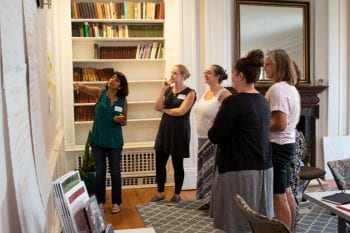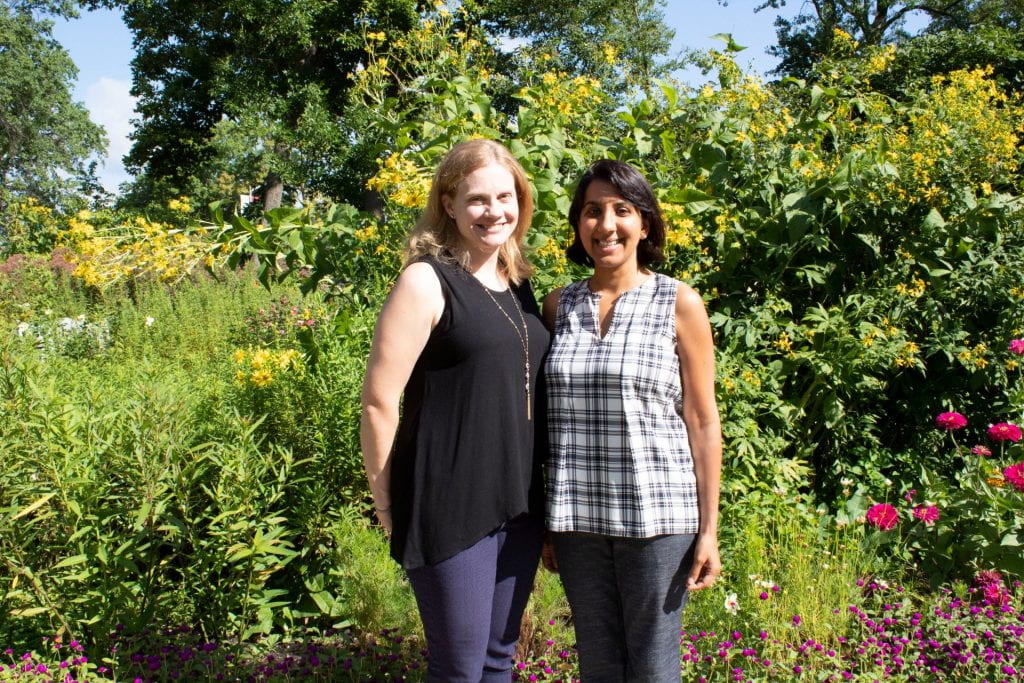Why is Wikipedia unreliable? What do you mean by “This source is biased?” How do I know if this data is skewed? Can’t I just Google it?
Seema Dahlheimer regularly encounters these sorts of questions in her Technical Writing course. Seema is the Assistant Director of the Engineering Communication Center and a Senior Lecturer in the McKelvey School of Engineering. This fall, she is co-instructing one of a dozen undergraduate Technical Writing sections alongside Lauren Todd, the Engineering Subject Librarian. “We’ve worked together for 8 years,” Lauren shared, “but this is the first time we are co-teaching with an increased focus on information literacy.”
In their course syllabus, Seema and Lauren define information literacy as finding, evaluating, and using sources in meaningful ways. Their goal is to help students to be intentional with the research they do and resources they find. “I want them to consider and even question the source,” Seema said. “Who is the author? Who is the audience? What is their authority with regards to this topic?” The pair will work with students to explore how they can evaluate research of different types and disciplines. By the end of the semester, students will gain an informed approach to finding and analyzing sources and an understanding that authority is often contextual.
Technical Writing is one of five undergraduate courses that will integrate information literacy and evaluation during the 2019-2020 academic year through a partnership with the Gephardt Institute, University Libraries, and The Teaching Center at Washington University. Seema and Lauren are one of five pairs selected to join the inaugural Information Literacy Learning Community for Faculty and Librarians (ILLC). According to Cassie Power, Associate Director for Faculty and Academic Engagement at the Gephardt Institute, the program aims to address barriers that keep faculty and librarians from working together by providing the space, time, and resources they need to co-develop information literacy learning opportunities within courses they already plan on teaching. Participants applied for the program in the spring and began in July 2019.
In addition to Technical Writing, ILLC courses include Topics in Anthropology: Bioprospecting (Anthropology), Experimental Psychology (Psychological & Brain Sciences), A Sense of Place: Exploring the Environment of St. Louis (Environmental Studies), and Intro to Arabic and Culture (Jewish, Islamic, and Middle Eastern Studies). Faculty members formed pairs with librarians whose expertise is a good match for the faculty’s course goals. For Seema and Lauren, the pairing builds on a long-standing working relationship and friendship. “We felt we’d be a good fit for the program because the groundwork was already laid,” Lauren explained. “I already help Technical Writing students with their research process – visiting classes, presenting resources, and holding office hours. As a co-instructor, I gain a more cohesive perspective and can work with Seema to think through new approaches as we develop a model for future semesters.”
ILLC members come from a broad range of disciplines, and for some, the pairing is the start of a new relationship and approach to teaching. All participants are committed to meeting course objectives that include information literacy skills, such as improving students’ ability to discern their information needs, find and evaluate information sources and claims, synthesize information, and use that information to an end. In preparation for the academic year, the five pairs joined Cassie, Amanda Albert from University Libraries, and Eric Fournier from the Center for Teaching and Learning for a four-day workshop. Topics included foundation-building and learning outcomes, assignment development, classroom instruction, and opportunities for integrating and communicating their work.

“I enjoyed the workshop experience,” Lauren said. “Every subject librarian approaches their job differently, and it was helpful to learn about and share strategies.” Seema agreed, saying, “It is energizing to build community with people interested in making our teaching better.” “In the past,” Lauren added, “I think we feared we would be infringing on each other’s time. The workshop shifted our perceptions about how we can help one another and what we each bring to the classroom.”
At the end of the four days, participants agreed to continue meeting on a monthly basis, and the learning will not stop there. Technical Writing, for example, serves all undergraduate engineering students. Seema and Lauren will share their learning and outcomes with their Technical Writing colleagues and hope to develop a model that can be adapted to other courses over time. “These tools could have a positive impact on every student coming through our classes each year,” Seema summed. At minimum, the students in her Technical Writing course will come to understand and agree: You can’t just Google it.
The 2019 Information Literacy Learning Community is generously funded by the Leslie Scallet Lieberman and Maury Lieberman Information Literacy Education Fund.
